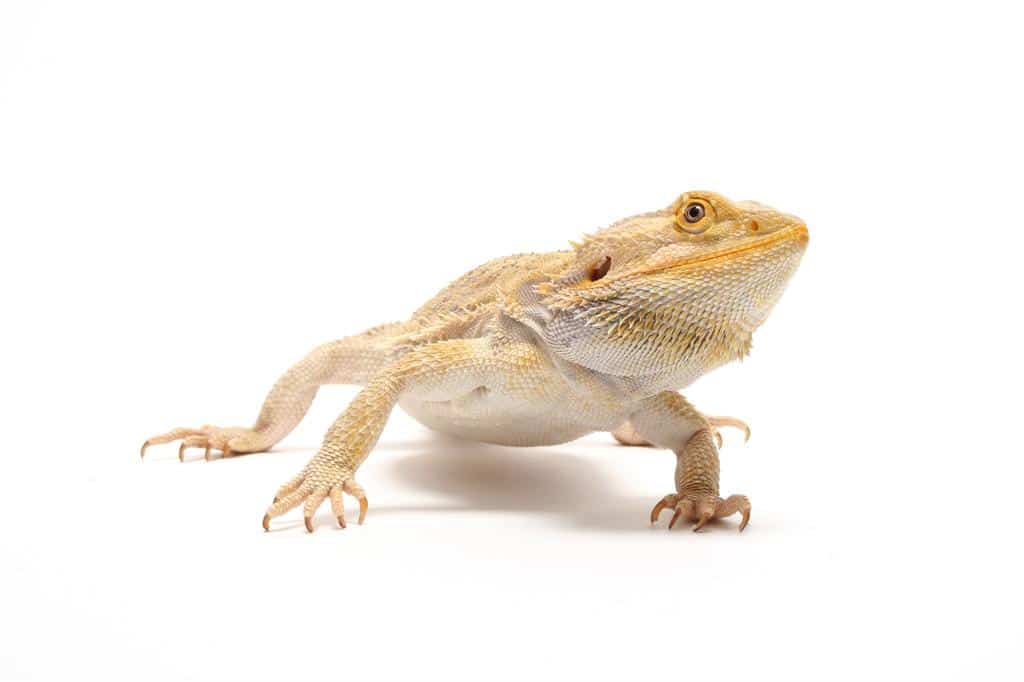My bearded dragon won’t eat, sleeps a lot and drags his back legs when he walks.
Q: I have a bearded dragon, and I’m worried he may be sick. My bearded dragon has not been eating, he sleeps a lot, and he drags his back legs when he walks. I took my bearded dragon to the veterinarian, and the veterinarian said he is not impacted. The veterinarian gave him a shot to boost his appetite. He also gave him NutricalTM, even though its label says it is for cats and dogs. My bearded dragon’s color is paling, and he will rarely open his eyes. I thought he had gone into hibernation, but the veterinarian said bearded dragons don’t hibernate. The veterinarian supposedly specializes in working with reptiles, but I am scared my bearded dragon is going to die. I feed my bearded dragon crickets, meal worms, greens, etc. He gets a daily 20-minute soaking in water, and he has a new UVB light and heat lamp on from 7 a.m. until 7 p.m. Then we turn off the heat lamp and leave the UVB on until 10 p.m. My bearded dragon fell off of his log in his terrarium, and his front arm swelled up. The veterinarian said this is the bone disease that bearded dragons get from not having enough UVB lights, which is why we bought a new one. Can you please give me advice on what to do with my bearded dragon?
Thank you,
Jennifer
A: It sounds as if your bearded dragon may have a problem with his spine. If your bearded dragon has already been diagnosed with a form of nutritional secondary hyperparathyroidism (the bone disease your veterinarian mentioned), this could explain his problem.
I cannot diagnose your bearded dragon. For that, you will need a qualified herp veterinarian whom you trust and who can take the necessary radiographs (X-rays) and perform any other tests necessary to diagnose what is causing your bearded dragon’s lameness. If you are not comfortable with the veterinarian you have used previously, then it is time to either get a second opinion or go back to him and let him know your bearded dragon is still very sick.
If your veterinarian doesn’t feel comfortable drawing blood or evaluating the radiographs, you could gently ask him to request a consultation with an experienced herp veterinarian. This consultation service is available through the larger veterinary diagnostic laboratories that perform exotic animal lab testing. The labs offer a free service so that veterinarians can call and speak with specialists and experienced exotic animal veterinarians who can provide information on diseases, testing, diagnostics, treatment and medication dosages.
There are also board-certified veterinary radiologists who take a special interest in reptiles and can evaluate and help diagnose problems through radiographs and ultrasound. Sometimes, it can be very difficult to see very subtle lesions involving the bones of smaller herps, such as your bearded dragon, so a boarded radiologist can be very helpful. Radiographs can be sent via snail-mail, or the veterinarian can take digital photographs of the films that can be e-mailed to a radiologist. Newer radiographs are often digital, which facilitates transmission via e-mail.
Your bearded dragon requires immediate medical attention, so please don’t wait. You need to schedule an appointment with a herp veterinarian as soon as possible. Your bearded dragon will probably require medication to help with the possible swelling in the spinal cord, and this will also help with any pain he might be feeling. Your bearded dragon may also benefit from calcium supplementation, fluid therapy and assist-feedings.
For an ill bearded dragon, I recommend soaking bearded dragon pellets in a sports drink and then putting them in the blender to make a gruel or smoothie that can be easily syringe-fed to him.
If you choose to locate another herp veterinarian, you have a couple of ways to find one. You can call a few veterinary clinics that don’t see reptiles and ask them who they refer herps to. You can also call around to some local pet retailers and ask who they use as a reptile veterinarian.
If you decide to go back to the first veterinarian who already examined your bearded dragon, please don’t hesitate to politely recommend that he utilize the free consultation service provided by the larger veterinary diagnostic labs.
No veterinarian should be embarrassed or ashamed to ask another, more experienced, veterinarian for assistance with a case.
There are other possible reasons your bearded dragon is dragging his hind legs. So, proper examination and diagnosis of your bearded dragon are vital so he can begin receiving appropriate therapy.
Please take your bearded dragon in as soon as possible to be evaluated by a herp veterinarian.
Need a Herp Vet?
If you are looking for a herp-knowledgeable veterinarian in your area, a good place to start is by checking the list of members on the Association of Reptilian and Amphibian Veterinarian (ARAV) website at www.arav.com. Look for DVMs who appear to maintain actual veterinary offices that you could contact.
Or, check out the state by state Reptile Magazine Vet Listings.


